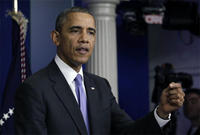-
New York mulling first U.S. college dedicated to homeland security studies
Political, educational, and law enforcement leaders in New York are actively exploring the idea of creating pro the U.S. first college focused on emergency management and homeland security on the Syracuse University (SU) campus. “Believe it or not, there is no such college,” Governor Andrew Cuomo said during his fourth State of the State address two weeks ago. “I believe this is a field that is only going to grow. Unfortunately, it’s only going to get worse. And we want this college right here in the state of New York, training our people and training others from around the country.”
-
-
CBP flew its drones on behalf of other agencies
The U.S. Customs and Border Protection(CBP) operates the largest drone fleet in the United States. The Defense Departmenthas a much larger fleet, but it is prohibited from operating its drones in the United States for law enforcement missions. The FAA is working on opening U.S. skies for public and commercial drone traffic, but for now CBP is the only agency permitted to operate drones on a daily basis within the nation’s borders. Released documents show that agencies not allowed to operate drones borrowed them from CBP.
-
-
Assad bolsters al-Qaeda affiliates in Syria with secret oil deals, prisoner release: Western intelligence
Western intelligence agencies say that President Bashar al-Assad’s regime, in a complex double game, has provided funds to and cooperated with al-Qaeda-affiliated terrorist organizations in Syria even as these organizations fight the Syrian military. The regime has two goals in pursuing this policy. The first is to persuade the West that the uprising is inspired and led by Islamist militants, including al-Qaeda and its affiliates, in order to weaken, and even stop, Western support for the rebels. The second is to allow the jihadists to gain the upper hand in the internal fighting among rebel groups. The regime believes that if the rebellion is seen to be led by Islamist fundamentalists rather than secular and moderate Syrians, more non-Alawite Syrians would side with the regime against the rebels, even if grudgingly.
-
-
Judge denies defense request to see whether NSA surveillance led to terrorism charges
U.S. District Judge Sharon Johnson Coleman on Friday ruled that lawyers for Adel Daoud, a 20-year old resident of Hillside, a suburb west of Chicago, who was charged with plotting to set off a powerful bomb outside a crowded Chicago bar, will not be allowed to examine whether the investigators who initiated the sting operation which led to Doud’s arrest relied on information gleaned from NSA surveillance programs. Attorneys for Daoud had asked Judge Coleman to instruct prosecutors to disclose “any and all” surveillance information used in Daoud’s case, including information disclosed to a U.S. Senate’s Select Committee on Intelligence. In a brief ruling posted late Friday, Coleman denied the motion, writing that the defense had “failed to provide any basis for issuing such an order.” Prosecutors would not confirm whether the FBI had initiated its operation against Doud as a result of a tip from the NSA, but they did say that even if such surveillance did exist, they have no plans of using it at trial and the defense was not entitled to it.
-
-
California lawmakers propose restricting use of antibiotics in livestock

The growth of antibiotic-resistant bacteria in humans has been attributed to the increasing use of antibiotics in livestock. The Centers for Disease Control and Prevention(CDC) estimates that antibiotic-resistant bacteria infect more than two million Americans a year,killing at least 23,000 of them. California legislators are proposing new laws to restrict the use of antibiotics in livestock.
-
-
Economists propose market-driven solutions to the problem of antibiotic use in agriculture
Fifty-one tons of antibiotics are consumed daily in the United States, of which 80 percent are used in agriculture. To minimize the overuse of antibiotics in livestock, Aidan Hollis of the University of Calgary is proposing the imposition of an antibiotic tax on food producers, thus encouraging them to distinguish between good and bad use of antibiotics, since the fee would force farmers to purchase antibiotics only when needed to treat sick animals and not for non-illness purposes.Timothy Richards of Arizona State University says that more regulations or a tax would run the risk of harming the agriculture industry. He says that farmers and ranchers should clearly label their products as containing or not containing antibiotics, and then market dynamics would operate by “letting people follow labels and buy or not buy meats where antibiotics are used.”
-
-
Rep. Rogers, House Intelligence chair: Russian intelligence may have helped Snowden

Representative Mike Rogers (R-Michigan), chairman of the House Intelligence Committee, said that Russia may have helped the former NSA contractor Edward Snowden to reveal details of surveillance programs and escape U.S. authorities last year. Rogers said he could reveal evidence which would support his claims, but suggested Snowden “used methods beyond his technical capabilities” and had help with his travel arrangements. Rogers’s comments were backed by Michael McCaul (R-Texas), chairman of the House Committee on Homeland Security. Senator Diane Feinstein (D-California), chair of the Senate Intelligence Committee, asked whether he was aided by the Russians, said: “He may well have.”
-
-
Judge says DHS made “mistake” placing Malaysian woman on terrorist watch no-fly list
Rahinah Ibrahim, 48, was prevented by TSA agents from boarding a plane in San Francisco in 2005 because his name showed up – erroneously –on the government terrorist watch no-fly list. She was eventually allowed to leave the country, but has not been allowed to re-enter the United States since. Last Tuesday, U.S. District Judge William Alsup ruled that DHS made a “mistake” when it put Ibrahim, a former Stanford University Ph.D. student, on the list, and that the government must give her an opportunity to apply for reentry to the United States. Ibrahim’s challenge of the government’s actions is believed to have been the first trial of its kind in the country. It was held before Judge Alsup without a jury.
-
-
House approves $447 for Cyber Command
The House of Representatives approved a fiscal 2014 stop-gap budget last Monday (it approved to full spending bill on Wednesday), which allocates $447 million to the Defense Department’s Cyber Command. This is more than twice the $191 million budget for Cyber Command in 2013.
-
-
Obama announces reforms of U.S. intelligence data collection practices
President Barack Obama on Friday called for a “new approach” by the U.S. intelligence community to the collection of Americans’ phone metadata. The major changes in current practices involve storage of and access to bulk metadata; the presence of a public advocate during FISA court deliberations; new privacy protections for non-Americans; and new restrictions on spying on leaders of allied countries. Obama offered a robust defense of the U.S. intelligence services, saying that there was no evidence they had abused their power, and that many of their methods were necessary to protect Americans. “We will not apologize simply because our services may be more effective,” he said. The president pointedly noted that some countries that “have loudly criticized the NSA privately acknowledge that America has special responsibilities as the world’s only superpower . . . and that they themselves have relied on the information we obtain to protect their own people.”
-
-
New L.A. fault map threatens Hollywood development projects
The state of California recently released new geological maps which reveal the presence of an active earthquake fault along the path of major developments in Hollywood. The maps established a zone of 500 feet on both sides of the fault, and state law will require new developments within the zone to conduct underground seismic testing to determine whether the fault runs beneath planned development sites. Building on top of faults is prohibited. Three prominent Hollywood developments — the Millennium Hollywood skyscraper project, the Blvd6200 development, and an apartment project on Yucca Street — are within the 500-foot fault zone.
-
-
Obama uses executive power to changes immigration policy

President Barack Obama is using executive power to tackle the country’s immigration issues while Congress makes little progress on immigration overhaul. The president issued executive orders prohibiting deportations of individuals who arrived in the United States illegally as children, individuals who care for children, and individuals who have no criminal records. Recently, some relatives of military service members living in the country illegally have been allowed to remain in the country as a way to lessen stress on the military and reward veterans.
-
-
Massachusetts takes steps to withstand climate change impacts
Governor Deval Patrick of Massachusetts earlier this week unveiled a $50 million plan to help prepare Massachusetts for the challenges climate change poses to energy supplies, public health, transportation, and basic infrastructure in his state. A $40 million grant from the state’s Department of Energy Resources will help cities and towns develop protections around energy services, and $10 million will go toward shoring up critical coastal infrastructure and dam repair.
-
-
House bill cuts $200 million from DHS headquarters project
The House yesterday (Wednesday) approved a spending measure which would reduce funding for a new DHS headquarters in Southeast Washington by about $200 relative to the funds requested by the agencies overseeing that project for 2014. DHS, created in 2003, is the third largest government department, and it operates out of fifty different facilities located in Washington, D.C. and neighboring states. In 2008 Congress approved the establishment of a single DHS campus on the grounds of St. Elizabeth’s, a former government-run mental hospital in Anacostia. The project has been hobbled by delays and cost overruns.
-
-
NRC: storing spent nuclear fuel in cooling pools is safe
The nuclear reactors now in service in the United States were built with the assumption that the spent fuel would be removed from nuclear the facilities after a few years, but because the government has failed to provide a centralized place to store the spent fuel, utility companies have had to store an ever-growing quantity of it in spent fuel pools on the grounds of the facilities. Scientists argue that it would be safer to move some of the spent fuel into giant steel and concrete casks, where it can be stored dry, with no reliance on water, pumps, or filters to keep them cool. The nuclear industry and the NRC do not agree.
-
More headlines
The long view
What Does Netflix’s Drama “Adolescence” Tell Us About Incels and the Manosphere?
By Lewys Brace
While Netflix’s psychological crime drama ‘Adolescence’ is a work of fiction, its themes offer insight into the very real and troubling rise of the incel and manosphere culture online.
A Shining Star in a Contentious Legacy: Could Marty Makary Be the Saving Grace of a Divisive Presidency?
While much of the Trump administration has sparked controversy, the FDA’s consumer-first reforms may be remembered as its brightest legacy. From AI-driven drug reviews to bans on artificial dyes, the FDA’s agenda resonates with the public in ways few Trump-era policies have.
The Center Can Hold — States’ Rights and Local Privilege in a Climate of Federal Overreach
As American institutions weather the storms of executive disruption, legal ambiguity, and polarized governance, we must reexamine what it means for “the center” to hold.
How to Reverse Nation’s Declining Birth Rate
By Alvin Powell
Health experts urge policies that buoy families: lower living costs, affordable childcare, help for older parents who want more kids
Foundation for U.S. Breakthroughs Feels Shakier to Researchers
By Max Larkin
With each dollar of its grants, the National Institutes of Health —the world’s largest funder of biomedical research —generates, on average, $2.56 worth of economic activity across all 50 states. NIH grants also support more than 400,000 U.S. jobs, and have been a central force in establishing the country’s dominance in medical research. Waves of funding cuts and grant terminations under the second Trump administration are a threat to the U.S. status as driver of scientific progress, and to the nation’s economy.
The True Cost of Abandoning Science
By Steven R. Furlanetto
“We now face a choice: to remain at the vanguard of scientific inquiry through sound investment, or to cede our leadership and watch others answer the big questions that have confounded humanity for millennia —and reap the rewards.”
